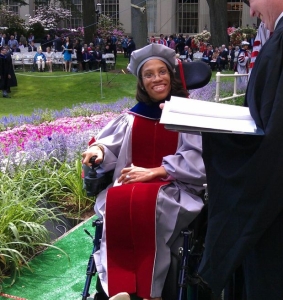 Allison Thompkins ’04 has never been short on confidence, courage, or hope while living with cerebral palsy. Thompkins uses a wheelchair and has challenges speaking and typing, yet refuses to let anything get in the way of her success advocating for disability rights.
Allison Thompkins ’04 has never been short on confidence, courage, or hope while living with cerebral palsy. Thompkins uses a wheelchair and has challenges speaking and typing, yet refuses to let anything get in the way of her success advocating for disability rights.
“I have been given the gift to be creative and to craft my own solutions for the paths and goals I have,” she says. “I have a very different perspective on the world and am able to see possibility and opportunity where others see impossibility.”
Thompkins uses this hopeful outlook in her work to advance disability rights.
While working on her PhD in economics at MIT, she served as a disability policy intern for then U.S. Senator John Kerry D-MA. In addition to fielding phone calls, emails, and letters from people facing challenges, Thompkins also held weekly meetings with disability centers in the state. The experience of seeing how effective public policies can help individuals of all abilities encouraged her advocacy.
“I witnessed first-hand the critical impact of citizens organizing and clearly, persuasively, and precisely presenting their needs – as well as the solutions necessary to meet their needs,” she says. “I saw how important it is for people to be proactive in educating our elected officials.”
Thompkins pursues this passion full-time at Mathematica Policy Research, where she applies her mathematics degree to her desire to inspire change by using numeric analysis to recommend policy changes. She and her colleagues analyze the outcome of current policies and propose new approaches based on analysis.
Thompkins says today’s chief concerns for those who are disabled include getting a job, finding affordable accessible housing, and providing and receiving in-home support services.
“Currently, if someone has a disability or someone is abled bodied, it enforces a dichotomy,” she says. “Everyone I know who has a disability is able, and I would love to see the day when the English language reflects that and speaks to the idea that disability and ableness can exist simultaneously.”
A long-term goal for Thompkins is the development of language surrounding rejecting this dichotomy; “differently-abled” is not quite adequate because it still supposes one is “different” than a presupposed norm.
During her studies of mathematical economics, Scripps fostered Thompkins’ zeal for equal rights.
As a first year student in Core, Thompkins completed her first college-level research project on disability issues. The faculty recognized her scholarship for its excellence, and Thompkins called this recognition “eye-opening” and strong encouragement to continue along the path of disability advocacy.
She also participated on the Board of Trustees as a student representative, where she realized how much the Board members value the insights of Scripps students. Her time on the Board also gave her early experience advancing policy issues with key decision-makers.
One of Thompkins’ fondest memories of Scripps is living in Kimberly with her friends, who had long told her about the beautiful views from the roof of the residence halls. One night, a few of her friends gave her a piggy-back ride to the top of the residence hall. This spirit of inclusion made Scripps special for Thompkins.
“From the time I stepped on campus, I knew I’d found home,” Thompkins said.

